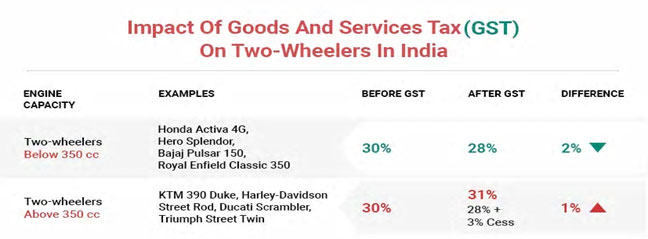GST ON TWO WHEELERS
03 June 2019

The two-wheeler Automobile segment is broadly classifiable under two segments, viz., those of Engine Capacity of less than 350cc and those of above 350 cc. While the segment above 350cc is generally perceived as Luxury bikes segment, the segment below 350 cc (particularly those of less than 120 cc) cater for the basic mobility to the masses in India.
Prior to the advent of Goods & Services Tax, there was not much to differentiate in tax rates, since both these types of vehicles carried a total tax rate of 30% (which contained Excise Duty, VAT, CST etc.)
However, with the introduction of GST, with effect from 1st July 2017, a unified GST rate, subsuming Central and State taxes was introduced and with this while two wheelers with Engine Capacity of less than 350cc are now charged to 28%, which is down 2% as compared to the earlier rate, the segment of two wheelers of capacity more than 350cc witnessed a tax rate of 28% GST + 3% Cess, (totally 31%), which was up by 1% from the tax rate in Pre-GST regime.
While the GST rates for the two-wheeler segment, are largely neutral as the below 350cc segment is subjected to base rate of GST of 28%, those above 350cc segment, (which is only 0.4% of overall industry sales) which includes luxury bikes, such as Royal Enfield, are charged an overall tax rate of 31%. To sum it up, GST tax on bikes under 350cc is 28 percent (reduced from 30 percent) and GST tax on bikes above 350cc is 31 percent (increased from 30 percent). The price of bikes under 350cc has been reduced by around 2 percent and the bikes above 350cc got a price hike of around 1 percent. The following table is indicative of the tax structures prior and post Goods and Services Tax regime.

Yet, the leading manufacturers of leading two wheelers in India, viz., Hero MotoCorp, TVS and Bajaj, are pitching for a lower Goods and Services Tax rate of 18% on two wheelers of mass usage, since prices of two-wheelers are expected to increase post the implementation of the new safety and emission norms. The demand is powered by the facts that two wheelers cater for basic mobility to the masses for whom two wheelers are life-line and a reduction in rate of GST shall give a much-needed relief to such two-wheeler customers across the country.
Recently, the Society of Indian Automobile Manufacturers (Siam), had joined the bandwagon supporting the case for a reduction in goods and services tax (GST) on scooters and bikes from 28% to 18% to ease the incoming pricing pressure on the automobile industry. SIAM president Rajan Wadhera, emphatically argues that automobiles, cars and two-wheelers alike, are expected to cost 10-15% more from 1 April 2020, with the enforcement of Bharat Stage VI (BS-VI) emission norms and new safety regulations and that the industry fears that with the increase in prices, the demand for their products would be impacted. He stated that new safety norms would up the cost and lead to slowdown in the demand, while cautioning the Government that if the demand goes down, government collection of taxes would also go down. On a positive note, he pitched for 18% rate of GST as a win-win situation.
Liberty General Insurance offers comprehensive two-wheeler insurance policies. To avail one, click here.







